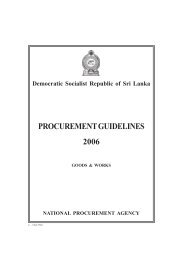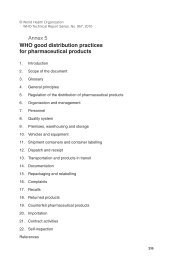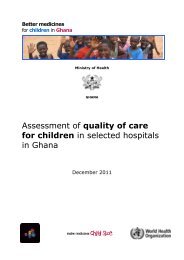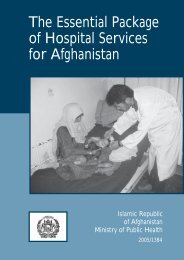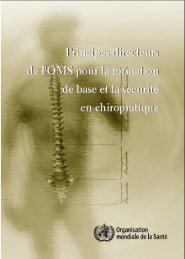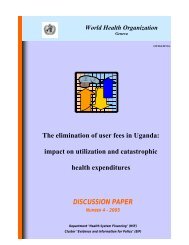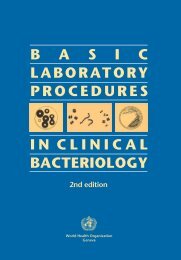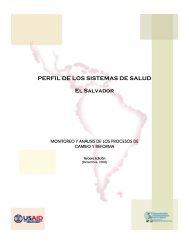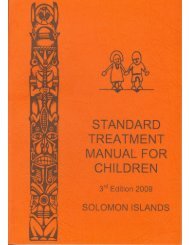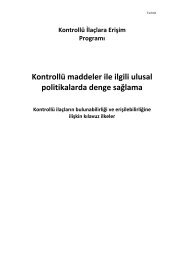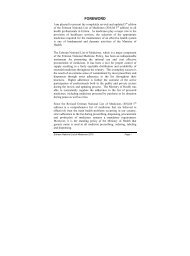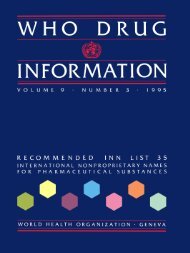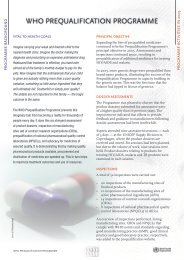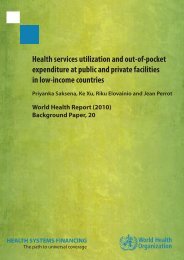Safe Blood Starts with Me - libdoc.who.int - World Health Organization
Safe Blood Starts with Me - libdoc.who.int - World Health Organization
Safe Blood Starts with Me - libdoc.who.int - World Health Organization
You also want an ePaper? Increase the reach of your titles
YUMPU automatically turns print PDFs into web optimized ePapers that Google loves.
<strong>World</strong>wide, 5–10% of cases of HIVinfection are transmitted throughthe transfusion of infected bloodand blood products. Other majordiseases that can be transmittedinclude viral hepatitis B and C,syphilis, malaria and Chagasdisease. Globally, each yearunsafe transfusion and injectionpractices cause an estimated8–16 million hepatitis virus Binfections, 2.3–4.7 millionhepatitis virus C infections and80 000–160 000 HIV infections.WHO is working <strong>with</strong> nationalauthorities and clinicians topromote blood safety and toreduce the spread of HIV andother infections through bloodtransfusion in all countries,especially those most in need, byadvocating and assisting in thedevelopment of policies andinfrastructures and the training ofpersonnel. For example, a new setof Russian-language distancelearningmaterials on blood safetyand the clinical use of blood was<strong>int</strong>roduced to high-levelministerial representatives in 14of the newly independent statesof the former USSR last month.Transfusion medicine specialistsand clinicians <strong>with</strong> an <strong>int</strong>erest <strong>int</strong>ransfusion practice from acrossEurope gathered on 6–7 April2000 in London, United Kingdom,under the auspices of the WHOCollaborating Centre at theNational <strong>Blood</strong> Service(Birmingham), to agree on andissue recommendations to assistall European <strong>Me</strong>mber States indeveloping their own policies, inline <strong>with</strong> WHO guidelines, toreduce inappropriate bloodtransfusions and to promote theuse of alternatives.“Encouraging physicians to stopand think whether a transfusion isthe best option is fundamental,”said Dr Gamal Gabra, head of theWHO Collaborating Centre and theprincipal coordinator of themeeting. “We want to alertgovernments to the need to lookcarefully at using blood, to have anational policy in place and tomonitor quality and outcomes on aregular basis, making sure thatthe right product goes to the rightpatient at the right time <strong>with</strong>outunnecessary overuse orunderuse.”“Experts discussed a variety ofrecommendations” noted Dr IsufKalo, WHO Regional Adviser forQuality of Care and Technology.“For example, the most seniorperson in the treatment teamshould make the decision to useblood and blood products.Clinicians should be encouraged toreview and update their clinicalprinciples on the use of blood, tominimize its use and to encouragealternatives or replacements, aspart of a national policy on bloodtransfusion. Patients should beassessed carefully and on anindividual basis, and all availablealternative therapies exploredbefore a decision is made. Inaddition, the experts madespecific recommendations fortransfusion practice during andafter childbirth and inemergencies.”The final recommendations of theexpert group were forwarded tothe WHO Regional Committee forEurope which met in September2000 in Copenhagen. ▲(Adapted from WHO Press ReleaseEURO 05/00, Copenhagen, 7 April2000. Available in English,French, German and Russian.)For further information on bloodsafety activities in the EuropeanRegion, contact:Dr Isuf Kalo, Regional AdviserQuality of Care and TechnologiesWHO Regional Office for EuropeScherfigsvej 8, DK-2100Copenhagen Ø, DenmarkTel.: +45 39 17 12 65Fax: +45 39 17 18 80E-mail: ika@<strong>who</strong>.dkInternet: www.<strong>who</strong>.dk/64 ▲ WORLD HEALTH DAY ▼ SAFE BLOOD STARTS WITH ME



